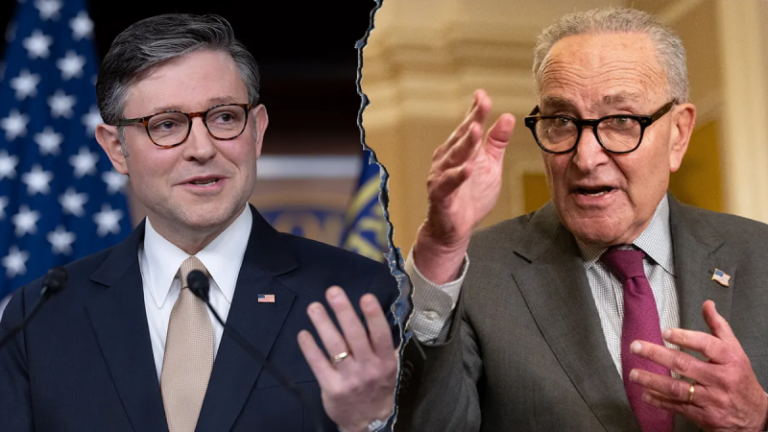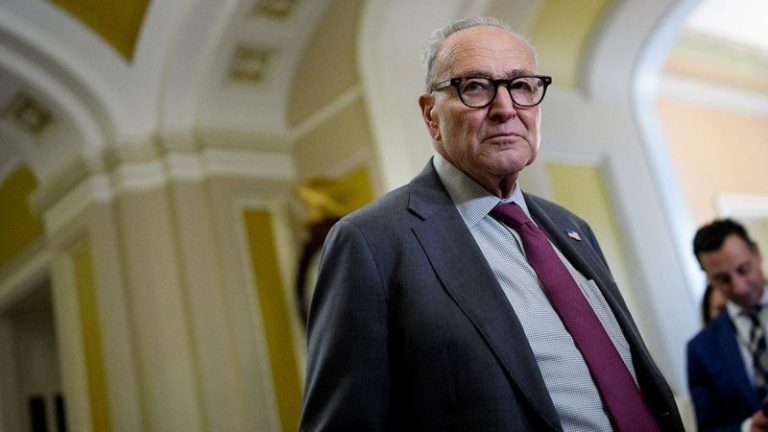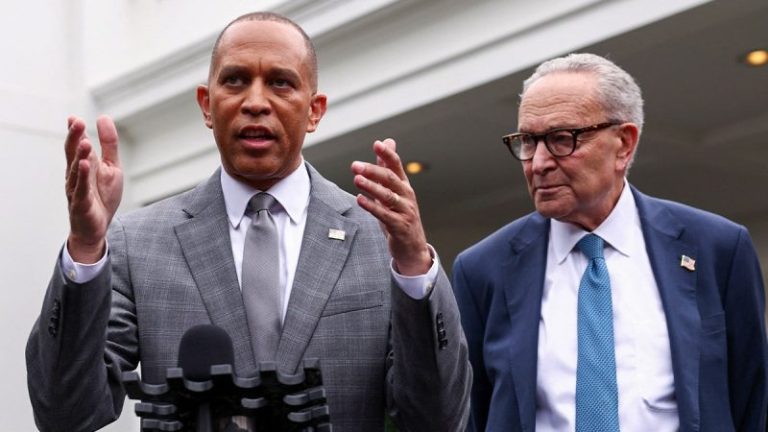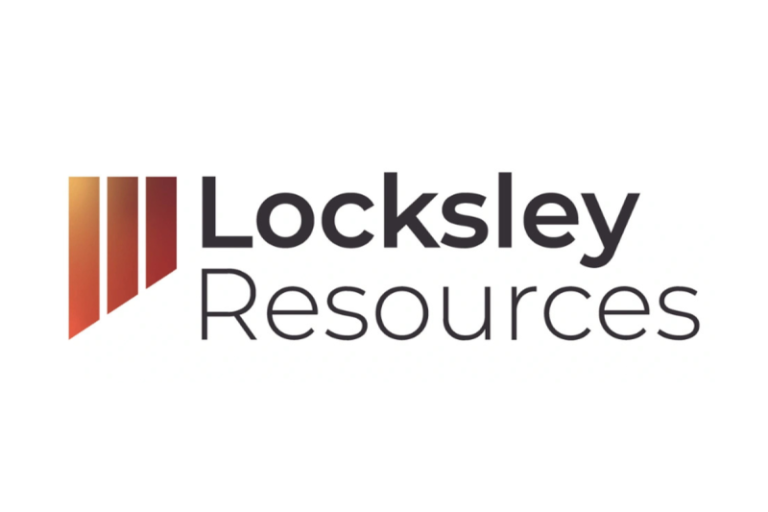President Donald Trump secured a historic peace deal between Israel and Hamas this week that will end the war in Gaza and return the hostages, two years after the terrorist network attacked Israel Oct. 7, 2023 — all while the U.S. government remains in a shutdown due to a stalemate in the Senate.
The president made the announcement on his Truth Social platform Wednesday.
‘I am very proud to announce that Israel and Hamas have both signed off on the first Phase of our Peace Plan,’ the president posted. ‘This means that ALL of the Hostages will be released very soon, and Israel will withdraw their Troops to an agreed upon line as the first steps toward a Strong, Durable, and Everlasting Peace. All Parties will be treated fairly!’
The president said the day of the agreement was ‘a GREAT Day for the Arab and Muslim World, Israel, all surrounding Nations, and the United States of America, and we thank the mediators from Qatar, Egypt, and Turkey, who worked with us to make this Historic and Unprecedented Event happen.’
‘BLESSED ARE THE PEACEMAKERS!’ he posted.
According to Israeli officials, the living hostages are expected to be released in a single phase within 72 hours. The return of the bodies of deceased hostages will take longer, but Israel insists on their inclusion in the deal.
Trump warned that if Hamas did not agree to the deal, Israel would have the full backing of the U.S. to carry out its operational plans in Gaza.
Moments before the president’s announcement, photos emerged from the negotiation room in Sharm el-Sheikh, Egypt, showing senior officials embracing and shaking hands as reports indicated significant progress toward a hostage release deal. Retired Israeli Defense Forces Major General Nitzan Alon was seen shaking hands with Qatar’s prime minister, with U.S. special envoy Steve Witkoff in the background.
On the other side, Hamas leader Khalil al-Hayya and other senior officials appeared smiling.
Israeli Prime Minister Benjamin Netanyahu said in a statement, ‘With God’s help, we will bring them all home.’
Netanyahu added in a statement in Hebrew, translated: ‘A great day for Israel. Tomorrow I will convene the government to approve the agreement and bring all our dear hostages home. I thank the heroic soldiers of the IDF and all the security forces — thanks to their courage and sacrifice we have reached this day. I thank from the bottom of my heart President Trump and his team for mobilizing for this sacred mission of freeing our hostages. With God’s help, together we will continue to achieve all our objectives and expand peace with our neighbors.’
The terrorist organization Hamas announced in an official statement, ‘After responsible and serious negotiations conducted by the movement and the Palestinian resistance factions regarding President Trump’s proposal in Sharm el-Sheikh, with the aim of ending the war of extermination against our Palestinian people and the withdrawal of the occupation from the Gaza Strip, Hamas announces the reaching of an agreement that ends the war on Gaza, provides for the withdrawal of the occupation, allows the entry of aid and implements a prisoner exchange.’
‘We greatly appreciate the efforts of the mediators in Qatar, Egypt and Turkey, and thank U.S. President Donald Trump for his efforts to bring about a final end to the war and the full withdrawal of the occupation from the Gaza Strip. We call on President Trump, the guarantor states of the agreement, and all Arab, Islamic and international parties to oblige the government of the occupation to fulfill all the agreement’s commitments, and not to allow it to evade or delay implementation of the accords.’
Trump is now expected to travel to the Middle East Sunday amid continued peace negotiations.
‘I may go there, sometime toward the end of the week. Maybe on Sunday, actually, and we’ll see,’ Trump said Wednesday from the White House as he kicked off a roundtable discussion event focused on the left-wing radical group Antifa.
‘We have a great team over there, great negotiators, and there are, unfortunately, great negotiators on the other side also,’ Trump added. ‘But it’s something I think that will happen. Got a good chance of happening.’
Meanwhile, the government shutdown continued this week, as Senate lawmakers again failed to reach a budget agreement.
Now, senators have left Washington, D.C., and plan to return to Capitol Hill early next week, as Republicans and Democrats in the upper chamber remain in a stalemate.
Lawmakers voted deep into the night Thursday on the 2026 National Defense Authorization Act, which advanced on a largely bipartisan vote. But the $925 billion package, which authorizes funding for the Pentagon, effectively was the last hurrah for the week in the upper chamber.
While there was discussion of putting the House GOP’s continuing resolution (CR), along with congressional Democrats’ counter-proposal, on the floor for one last vote, the plan never came to fruition. Both likely would have failed for an eighth consecutive time.
The president has slammed Democratic leaders for shutting down the government amid one of ‘the most successful economies.’
Trump said he is ‘happy to work with the Democrats on their Failed Healthcare Policies, or anything else, but first they must allow our Government to re-open.’
Senate Minority Leader Chuck Schumer, D-N.Y., and most Democrats say they won’t support funding the government unless Congress agrees to extend expiring Obamacare subsidies.
Meanwhile, the president also saw two of his political foes face federal indictment this week.
Former FBI Director James Comey appeared in federal court in the Eastern District of Virginia Wednesday morning and pleaded not guilty to two counts of making a false statement in the jurisdiction of the legislative branch and one count of obstructing a congressional investigation related to the Trump–Russia probe.
Comey’s trial is set to begin Jan. 5, 2026.
And Thursday evening, New York Attorney General Letitia James was indicted for mortgage fraud.
A federal grand jury in Virginia charged James with bank fraud and making false statements to a financial institution. The indictment centers on James’ purchase of a home in Norfolk, Virginia. Prosecutors allege she falsely claimed it as a second residence to secure better loan terms before leasing it to tenants.
James has denied wrongdoing, describing the charges as ‘political retribution.’
‘These charges are baseless, and the president’s own public statements make clear that his only goal is political retribution at any cost,’ James said in a statement.
Lindsey Halligan, the U.S. Attorney for the Eastern District of Virginia, said James faces up to 30 years in prison per count, up to a $1 million fine on each count and forfeiture if she’s convicted.
‘No one is above the law. The charges as alleged in this case represent intentional, criminal acts and tremendous breaches of the public’s trust,’ Halligan said. ‘The facts and the law in this case are clear, and we will continue following them to ensure that justice is served.’
This post appeared first on FOX NEWS










